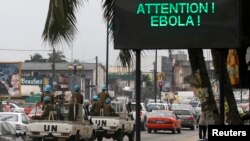This month, the World Health Organization declared the Ebola outbreak in West Africa a global public health emergency. Many international and national organizations are working to get supplies to medical teams in the field.
The international effort and the challenges facing the region were topics of discussion earlier this month at the Council on Foreign Relations in New York.
Health officials say with Ebola’s emergency designation, there will be a push to develop drugs to thwart the virus and to strengthen weakened national health care systems to identify, quarantine, and treat the infected.
Needed urgently are medical technicians, nurses, doctors, epidemiologists and trained health care workers.
The U.S. government is deploying a number of agencies, including the Department of State, The Department of Health and Human Services, the Centers for Disease Control and Prevention (CDC), and the Department of Defense. They are assisting with communications, supplies, and technical and medical expertise.
The U.S. Agency for International Development (AID) has spent $14 million in response efforts including the activation of a Disaster Assistance Response Team (DART). It will coordinate planning, logistics and other areas of the interagency response.
Some health care experts are concerned about the management and coordination of the response.
Budget cuts
Laurie Garrett, a Senior Fellow for Global Health at the Council on Foreign Relations, expresses concern about the funding needed to contain the virus.
She says budget cuts may have diminished the capacity of the World Health Organization (WHO), one of the leading institutions involved in the emergency response.
"Let's keep in mind, WHO has been running on a budget deficit," she said. "The World Health Assembly voted in their last session to cut the emergency epidemic response capacity of WHO. And if it weren't for the announcement from the World Bank that it will put $200 million into the effort, we basically would have an effort on the ground in Guinea, Sierra Leone, and Liberia funded on fumes, volunteer donations, and, you know, a few hundred people who are being unpaid to risk their lives in the middle of this outbreak."
Learning from experience
Garrett says there should be a strategic plan that makes clear the chain of command in the relief effort. The plan would also take into consideration past failures in global health emergencies, including the swine flu in 2009. Though the virus developed in the U.S., Mexico was hit hard. Garrett says Mexico received little international support by being open about the problem.
"Mexico followed all the rules of the game. They told the whole world, 'We have it.' They were completely transparent and open," she said. "They tried to bring it under control, and the response of the international community was, 'Woah, shut the borders to Mexico. Don't let any Mexican planes land anywhere. Penalize Mexico for having this outbreak.' That sent a message to the whole world, 'Wow, don't comply with regulations. Don't try and be a good global citizen in an outbreak because the rest of the world is going to really not be kind to you for doing so.'"
A more appropriate solution, she says, would have been a strategy that includes coordinated government responses to such emergencies. Today, many states have ad hoc plans that often contradict each other.
John Campbell, a Ralph Bunche Senior Fellow for Africa Policy Studies at the Council on Foreign Relations and also a former U.S. ambassador to Nigeria, says countries could begin to devise protocols under the aegis of Africa’s regional organizations, such as the African Union or ECOWAS, the Economic Community of West African States.
Politics and management
Good governance also comes into play in managing the crisis.
Campbell says one government that has responded well is Lagos State in Nigeria. When a man infected with Ebola arrived in the commercial capital, Lagos (the city), officials began tracing everyone he’d come in contact with - and quarantining him.
"In Lagos [State], a highly effective governor has been succeeded by another highly effective governor. And something approaching a social contract in Lagos is now emerging, a social contract in which people pay taxes and hold their governments accountable for providing services," he said. "Again, when you're talking about a city of 22 million people and with the porosity of boundaries and the movement of people, it's quite possible that even the authorities in Lagos will be overwhelmed. I certainly hope not, and it hasn't happened yet."
Challenges
But, Campbell warns that there’s real potential in urban areas for the rapid spread of the virus. Slums are packed with people, compared to rural areas, where there’s less density. Urban migrants may all speak dialects or languages from their region, which also makes education campaigns more difficult. Proposed solutions include involving in information campaigns influence-makers, including religious leaders.
Not all religious leaders -- or populations -- are amenable to Western health interventions. In northern Nigeria, polio vaccinators have been killed, and today, the area is the site of fighting between the military and Boko Haram militants who reject Western education and medicine.
As with others in West Africa, some northerners deny the existence of Ebola. Or, they say health workers are infecting them the disease or with sterilizing medicines.
"A huge unknown for us right now is how Boko Haram sees itself in the context of, you know, sort of global mobilized health campaigns and whether -- if there were Ebola in northern Nigeria, Boko Haram would be as obstructive as many are now being on the ground in Sierra Leone and Liberia," Laurie Garrett said.
Both senior fellows stress says it’s imperative for the international community to develop a comprehensive strategy for controlling emergency outbreaks, like Ebola. Campbell says there are plenty of diseases in Africa that can turn into pandemics.
When Ebola burns itself out, he says, there’s a good chance it will be replaced with something else.





